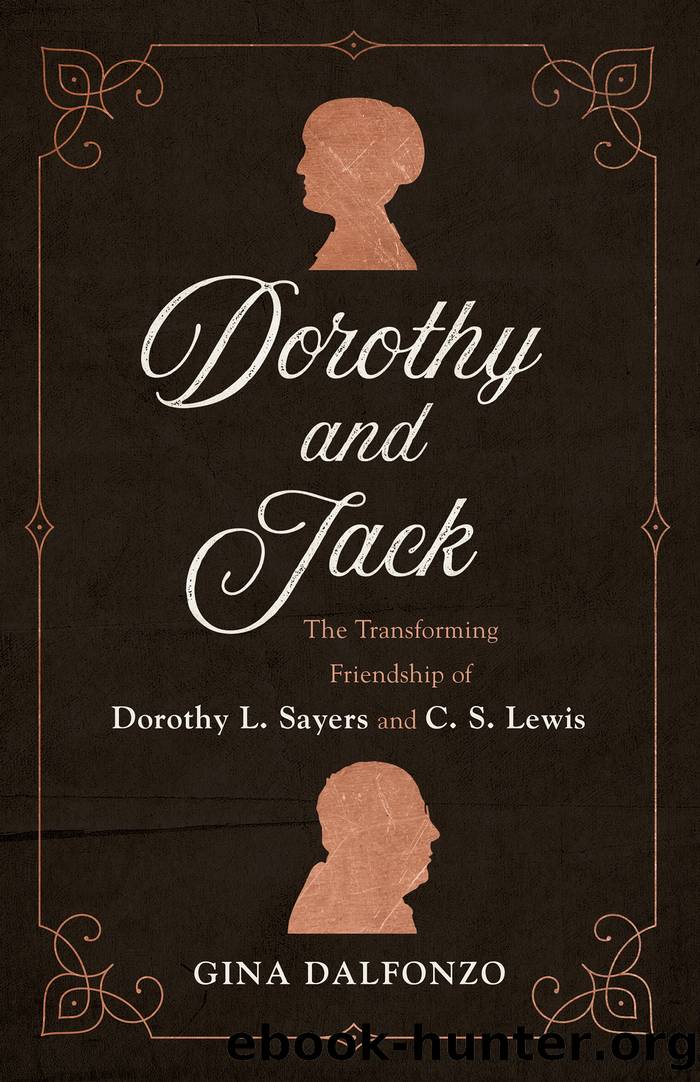Dorothy and Jack by Gina Dalfonzo

Author:Gina Dalfonzo
Language: eng
Format: epub
Tags: Christian Living;Dorothy Leigh Sayers (1893–1957—Religion);Dorothy L. Sayers (1893–1957—Friends and associates);Clive Staples Lewis (1898–1963—Religion);C. S. Lewis (1898–1963—Friends and associates);REL013000;BIO018000;REL012070
ISBN: 9781493424382
Publisher: Baker Publishing Group
Published: 2020-06-15T00:00:00+00:00
âA Rather Frightened Bachelorâ
Both Jack and Dorothy, then, believed that gender was not the most important thing that had to be taken into consideration about a person. And yet it still mattered more to him than it did to her. As much as he made exceptions for individuals, a lot of those generalizations were more deeply ingrained in him than he knew.
This was why, for instance, he could lay so much stress on the difficulties of friendship between the sexes in a book like The Four Loves, even after having enjoyed the friendship of women for much of his adult life. Characteristically, in that book he focused on the problems arising when well-educated men tried to be friends with not-so-well-educated womenâand treated it as a generalization, something common to most groups of men and women. Most of his descriptions of ideal friendship had to do with male friendship; he professed such a great ignorance of female friendship that he felt unable to say anything about it. As for male-female friendships, he acknowledged that they could arise when men and women worked in the same profession, but treated them as something rare and difficult to come by.
Of course, having gotten to know him, Dorothy could hardly help but be aware of his attitudeâquite possibly more so than he was. In December 1955, she wrote to Barbara Reynolds, whoâd had a chance to get acquainted with Lewis when he attended a meeting at her house.
Iâm glad you got hold of Lewis. . . . I like him very much, and always find him stimulating and amusing. One just has to accept the fact that there is a complete blank in his mind where women are concerned. Charles Williams and his other married friends used to sit round him at Oxford and tell him so, but there really isnât anything to be done about it. He is not hostile, and he does his best, and actually, for a person with his limitations I think he didnât do too badly with the Lady in Perelandra. What he suffers from chiefly, I think, is too much Romantic Literature, far too much Milton, and, as you can see from Surprised by Joy, a life bounded by school, the army, and the older universities. . . . He is probably frightened at bottom, like most of these superior males, and, like Milton, is capable of being clumsy and even vulgarâa thing you never find in Dante or Charles Williams, however eccentric or exaggerated their ideas about the sexes.42
Regarding Dorothyâs use of the word vulgar, Dr. Crystal Downing, codirector of the Marion E. Wade Center, suggests, âIt seems to me that she invokes it in its original Latin sense of âcommonâ (as in âThe Vulgateâ). So when Milton and Lewis are vulgar about women, they are reflecting the âcommonâ attitudes of their eras.â43 This is probably much the same definition of the word that Lewis was using when he complained of vulgarity in her essay for the Charles Williams book.
Download
This site does not store any files on its server. We only index and link to content provided by other sites. Please contact the content providers to delete copyright contents if any and email us, we'll remove relevant links or contents immediately.
| Military | Political |
| Presidents & Heads of State | Religious |
| Rich & Famous | Royalty |
| Social Activists |
Waking Up in Heaven: A True Story of Brokenness, Heaven, and Life Again by McVea Crystal & Tresniowski Alex(37812)
Empire of the Sikhs by Patwant Singh(23086)
We're Going to Need More Wine by Gabrielle Union(19046)
Hans Sturm: A Soldier's Odyssey on the Eastern Front by Gordon Williamson(18592)
Leonardo da Vinci by Walter Isaacson(13336)
The Radium Girls by Kate Moore(12028)
Tools of Titans by Timothy Ferriss(8396)
Educated by Tara Westover(8054)
How to Be a Bawse: A Guide to Conquering Life by Lilly Singh(7486)
Permanent Record by Edward Snowden(5847)
The Last Black Unicorn by Tiffany Haddish(5636)
The Rise and Fall of Senator Joe McCarthy by James Cross Giblin(5281)
Promise Me, Dad by Joe Biden(5154)
The Wind in My Hair by Masih Alinejad(5095)
A Higher Loyalty: Truth, Lies, and Leadership by James Comey(4964)
The Crown by Robert Lacey(4817)
The Iron Duke by The Iron Duke(4356)
Joan of Arc by Mary Gordon(4113)
Stalin by Stephen Kotkin(3968)
